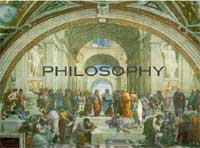|
 |
|
 |
| |
| |
| |
| |
| |
| |
| |
Campus: Kensington Campus
| |
| |
Career: Undergraduate
| |
| |
Units of Credit: 6
| |
| |
| |
| |
Indicative Contact Hours per Week: 3
| |
| |
Enrolment Requirements:
| |
| |
Prerequisite: 30 units of credit at Level 1
| |
| |
| |
| |
| |
| |
| |
 |
|
 |
Description
This is a shelf course. A shelf course comprises a number of modules related to this broad area of study. Each module is a separate semester of study in this area and is offered in rotation. You can study TWO modules but you cannot study the same module twice.
|
Subject Area: Philosophy
This course is intended to cover topics having to do with the nature of mind and meaning, both from a metaphysical and an epistemological point of view.
Module: "Truth and Belief" (Semester 1, 2011)
This module is an introduction to philosophical puzzles concerning the nature of belief, knowledge and the mind. We begin by considering the nature of belief, and specifically its connection to truth. It is a truism that beliefs are correct if and only if they are true. But what does this tell us about the nature of belief, or about the ways in which we form and abandon beliefs? From the topic of belief we move onto the nature of knowledge. Traditionally, knowledge has been taken to require something over and above merely true belief: a lucky guess, for example, does not count as knowledge. But what is this extra element, that distinguishes a lucky guess from knowledge? General metaphysical questions concerning the nature of the mind will also be discussed.
Module: "Philosophy of Mind"
This module begins by discussing the virtual disappearance of the idea of the soul, of the conscious self as an entity separate from the body which might go on existing without it. How has this come about? What alternative ideas have recent thinkers given us? Are these new ideas intellectually and humanly acceptable? Having become familiar with the major contemporary views about the nature of mind, we will turn to a range of related topics. Are minds just digital computers? Are states of mind are just states of our brains and nervous systems? How is it possible for mere aggregates of matter to possess consciousness and the capacity for thought?
Module: "The Use of Language, Images and Symbols" (Semester 2, 2011)
The leading question we consider in this course is:
- How do language, images and symbols function as a means of communication?
Our central concern is with the basis of their meanings and we study the way and extent to which our use of words, symbols and images gives them the meanings they have for us.
Our use of language, images and symbols is often contrasted with real action. We nevertheless can do a lot using language, images and symbols. This module explores that potential.
We also explore how we often succeed in communicating or conveying something different from what our words, images and symbols mean.
|



